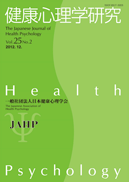Volume 19, Issue 2
Displaying 1-7 of 7 articles from this issue
- |<
- <
- 1
- >
- >|
-
2006 Volume 19 Issue 2 Pages 1-10
Published: December 25, 2006
Released on J-STAGE: March 28, 2014
Download PDF (1512K) -
2006 Volume 19 Issue 2 Pages 11-19
Published: December 25, 2006
Released on J-STAGE: March 28, 2014
Download PDF (1790K) -
2006 Volume 19 Issue 2 Pages 20-28
Published: December 25, 2006
Released on J-STAGE: March 28, 2014
Download PDF (1203K)
-
2006 Volume 19 Issue 2 Pages 29-35
Published: December 25, 2006
Released on J-STAGE: March 28, 2014
Download PDF (1190K) -
2006 Volume 19 Issue 2 Pages 36-43
Published: December 25, 2006
Released on J-STAGE: March 28, 2014
Download PDF (1695K) -
2006 Volume 19 Issue 2 Pages 44-53
Published: December 25, 2006
Released on J-STAGE: March 28, 2014
Download PDF (1386K) -
2006 Volume 19 Issue 2 Pages 54-61
Published: December 25, 2006
Released on J-STAGE: March 28, 2014
Download PDF (1334K)
- |<
- <
- 1
- >
- >|
